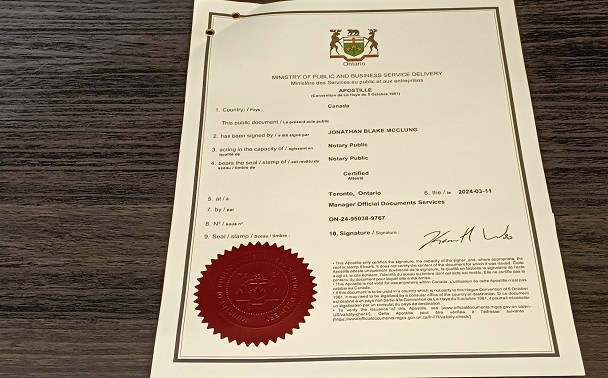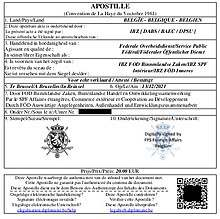Recognizing the Apostille Process: A Comprehensive Guide to International Paper Verification
Navigating the intricate landscape of global file verification can be intimidating without a clear understanding of the apostille process. This overview thoroughly details the required steps, from recognizing which records call for certification to sending them for verification by the Competent Authority. Realizing the relevance of an apostille and identifying possible mistakes, such as insufficient submissions and language obstacles, can considerably enhance the verification trip. What precisely specifies an apostille, and why is it so critical for papers destined for Hague Convention nations? These inquiries form the structure of our expedition into this necessary lawful treatment.
What Is an Apostille?
An apostille is a main qualification that verifies the authenticity of a record for use in one more country. This accreditation, released by a designated authority in the nation where the document stemmed, guarantees that the file is acknowledged as legitimate and reputable in the global field. The procedure of acquiring an apostille involves several actions, including the verification of the paper's signatures, seals, and stamps by ideal governmental bodies.
The apostille offers as an internationally identified kind of authentication, enabled by the Hague Convention of 1961. This treaty, formally referred to as the Hague Convention Abolishing the Demand of Legalisation for Foreign Public Records, systematizes the procedure of record accreditation among member nations. The apostille itself is a standard certification that contains particular details, such as the issuing authority, the nation of beginning, and the day of issuance.
It is essential to note that not all documents are qualified for an apostille. Generally, public documents like copyright, marital relationship licenses, court orders, and instructional diplomas get this accreditation. Personal files, such as contracts and arrangements, might call for notarization and extra actions to qualify.
Relevance of Apostille
Recognizing what an apostille is establishes the phase for appreciating its importance in international ventures. houston tx apostille. An apostille, basically a kind of qualification issued by an assigned authority, verifies the credibility of a paper for usage in foreign countries that are notaries to the Hague Apostille Convention. This standard procedure removes the demand for more legalization by consular offices or consulates, therefore improving global purchases
The importance of an apostille can not be overemphasized. It ensures the reputation and approval of necessary papers-- such as birth certifications, marriage licenses, and academic diplomas-- across borders. For organizations, it promotes the smooth conduct of global profession, mergings, and acquisitions by giving a relied on technique of paper confirmation. This reduces administrative hurdles, conserving both time and resources.
Furthermore, an apostille boosts lawful protection and compliance. Federal governments and organizations can with confidence depend on the credibility of documents bearing an apostille, minimizing the danger of fraud and misstatement.
Files That Require Apostille
When involving in international purchases or lawful issues, specific papers typically demand the authentication offered by an apostille. This ensures their recognition and approval in nations that are signatories to the Hague Apostille Convention. Frequently, personal Check Out Your URL documents such as birth certifications, marital relationship certifications, and death certificates require an apostille, especially when they are used for procedures like migration, marriage abroad, or worldwide probate matters.
Educational papers are another group regularly calling for apostilles. Diplomas, transcripts, and academic documents typically require this verification for objectives such as going after additional education, employment, or specialist licensing in a foreign country (houston tx apostille). This action assures that the papers are acknowledged as legitimate and valid
Lawful records, consisting of powers of attorney, affidavits, and court orders, likewise typically require apostilles. Company papers such as certificates of consolidation, bylaws, and industrial agreements might call for an apostille to assist in international trade, establish international branches, or take part in cross-border lawful proceedings.
Actions to Get an Apostille

Getting an apostille involves a multi-step procedure that ensures the authenticity and acceptance of your papers in foreign nations. The preliminary action is recognizing which records need an apostille. houston tx apostille. Common papers include birth certifications, marital relationship licenses, scholastic transcripts, and company files
When determined, the file must be accredited by the ideal issuing authority. After certification, the record should be sent to the designated Competent Authority in the paper's nation of beginning.
The entry process generally requires a finished application, the original document, and a cost. Some jurisdictions may provide the option of expedited handling for an additional charge. Upon successful verification, the Competent Authority will fasten the apostille certification to the file, consequently verifying its authenticity.
Common Obstacles and Solutions
Navigating the apostille procedure can offer numerous common difficulties that, otherwise appropriately addressed, may postpone or make complex paper authentication. One regular issue is the submission of inaccurate or incomplete files. Each nation has details requirements for the kinds of papers that can be apostilled, and any kind of deviation from these can lead to denial. Making sure that my sources all documents are exact and complete before entry is vital.
One more common difficulty is recognizing the diverse processing times. Processing times can differ dramatically between nations and even in between various areas within the exact same nation. dig this It is vital to represent these variations when planning the apostille process to prevent unanticipated delays.
Furthermore, language obstacles can present considerable obstacles. Papers in a foreign language commonly require qualified translations, and any kind of mistakes in translation can result in further complications. Involving a professional translation service can alleviate this threat.

Conclusion
Mastering the apostille process substantially improves the effectiveness of global record verification. By understanding the need of determining and licensing required documents, and navigating the entry to the Competent Authority, the process becomes more manageable.